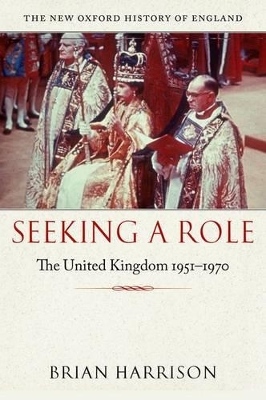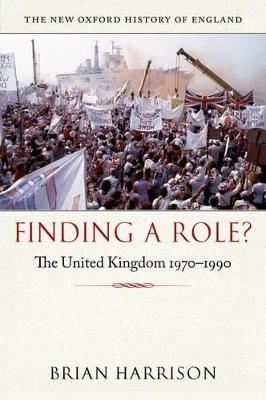New Oxford History of England
2 total works
In this, the first of two self-standing volumes bringing The New Oxford History of England up to the present, Brian Harrison begins in 1951 with much of the empire intact and Britain enjoying high prestige in Europe. The United Kingdom could still then claim to be a great power whose welfare state exemplified compromise between Soviet planning and the USA's free market. When the volume ends in 1970, no such claims carried conviction. The empire had gone,
central planning was in trouble, and even the British political system had become controversial.
In an unusually wide-ranging, yet impressively detailed volume, Harrison approaches the period from unfamiliar directions. He explains how British politicians in the 1950s and 1960s responded to this transition by pursuing successive roles for Britain: worldwide as champion of freedom, and in Europe as exemplar of parliamentary government, the multi-racial society, and economic planning. His main focus, though, rests not on the politicians but on the decisions the British people made largely
for themselves: on their environment, social structure and attitudes, race relations, family patterns, economic framework, and cultural opportunities. By 1970 the consumer society had supplanted postwar austerity, the socialist vision was fading, and 'the sixties' (the theme of his penultimate chapter)
had introduced new and even exotic themes and values. Having lost an empire, Britain was still resourcefully seeking a role: it had yet to find it.
central planning was in trouble, and even the British political system had become controversial.
In an unusually wide-ranging, yet impressively detailed volume, Harrison approaches the period from unfamiliar directions. He explains how British politicians in the 1950s and 1960s responded to this transition by pursuing successive roles for Britain: worldwide as champion of freedom, and in Europe as exemplar of parliamentary government, the multi-racial society, and economic planning. His main focus, though, rests not on the politicians but on the decisions the British people made largely
for themselves: on their environment, social structure and attitudes, race relations, family patterns, economic framework, and cultural opportunities. By 1970 the consumer society had supplanted postwar austerity, the socialist vision was fading, and 'the sixties' (the theme of his penultimate chapter)
had introduced new and even exotic themes and values. Having lost an empire, Britain was still resourcefully seeking a role: it had yet to find it.
In 1970 the 'cold war' was still cold, Northern Ireland's troubles were escalating, the UK's relations with the EEC were unclear, and corporatist approaches to the economy precariously persisted. By 1990 Communism was crumbling world-wide, Thatcher's economic revolution had occurred, terrorism in Northern Ireland was waning, 'multi-culturalism' was in place, family structures were changing fast, and British political institutions had become controversial.
Seven analytic chapters pursue these changes and accumulate rich detail on changes in international relations, landscape and townscape, social framework, family and welfare structures, economic policies and realities, intellect and culture, politics and government. The concluding chapter ranges chronologically even more widely to bring out the interaction of past and present, then asks how far the UK had by 1990 identified its world role. Like Harrison's Seeking a Role: The United Kingdom
1951-1970 (2009) - the immediately preceding volume in this series - Finding a Role? includes a full chronological table and an ample index of names and themes.
This, the first thorough, wide-ranging, and synoptic study of the UK so far published on this period, has two overriding aims: to show how British institutions evolved, but also to illuminate changes in the British people: their hopes and fears, values and enjoyments, failures and achievements. It therefore equips its readers to understand events since 1990, and so to decide for themselves where the UK should now be going.
Seven analytic chapters pursue these changes and accumulate rich detail on changes in international relations, landscape and townscape, social framework, family and welfare structures, economic policies and realities, intellect and culture, politics and government. The concluding chapter ranges chronologically even more widely to bring out the interaction of past and present, then asks how far the UK had by 1990 identified its world role. Like Harrison's Seeking a Role: The United Kingdom
1951-1970 (2009) - the immediately preceding volume in this series - Finding a Role? includes a full chronological table and an ample index of names and themes.
This, the first thorough, wide-ranging, and synoptic study of the UK so far published on this period, has two overriding aims: to show how British institutions evolved, but also to illuminate changes in the British people: their hopes and fears, values and enjoyments, failures and achievements. It therefore equips its readers to understand events since 1990, and so to decide for themselves where the UK should now be going.

